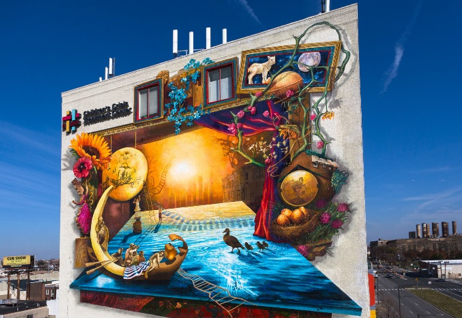Get Involved

 Become a Thought Partner
Become a Thought Partner
Partner with us to produce thought leadership that moves the needle on behavioral healthcare.
 Other options to get involved
Other options to get involved

Thank you!
We received your information and will be in contact soon!
Get Involved

 Grantmaking
Grantmaking
We fund organizations and projects which disrupt our current behavioral health space and create impact at the individual, organizational, and societal levels.
 Participatory Funds
Participatory Funds
Our participatory funds alter traditional grantmaking by shifting power
to impacted communities to direct resources and make funding decisions.
 Special Grant Programs
Special Grant Programs
We build public and private partnerships to administer grant dollars toward targeted programs.
 Program Related Investments
Program Related Investments
We provide funds at below-market interest rates that can be particularly useful to start, grow, or sustain a program, or when results cannot be achieved with grant dollars alone.
Get Involved

 Tia Burroughs Clayton, MSS
Tia Burroughs Clayton, MSS
Learning and Community Impact Consultant
Add some text here
 Alyson Ferguson, MPH
Alyson Ferguson, MPH
Chief Operating Officer
Contact Alyson about grantmaking, program related investments, and the paper series.
 Samantha Matlin, PhD
Samantha Matlin, PhD
Senior Learning & Community Impact Consultant
Contact Samantha about program planning and evaluation consulting services.
 Caitlin O'Brien, MPH
Caitlin O'Brien, MPH
Director of Learning & Community Impact
Contact Caitlin about the Community Fund for Immigrant Wellness, the Annual Innovation Award, and trauma-informed programming.
 Joe Pyle, MA
Joe Pyle, MA
President
Contact Joe about partnership opportunities, thought leadership, and the Foundation’s property.
 Bridget Talone, MFA
Bridget Talone, MFA
Grants Manager for Learning and Community Impact
Add some text here

The American Paradox: we are leaders of the free world, and yet our country lags behind in just about every indicator of what constitutes a successful society. Compared to much of the developed world, we have higher rates of poverty, unemployment, obesity, and incarceration, and lower rates of high school graduation, voter turnout, and life expectancy. With “Wicked Problems” aplenty, the task of making our communities healthier, happier, and more prosperous can seem overwhelming at best, yet this is the space in which many philanthropists ply their trade.
Fortunately, exploration and innovation still run deep in the American spirit; we have the power and drive to tackle many of the social ills we face. Thanks to recent scientific advances, there is new hope for a more effective—in fact, revolutionary—paradigm for approaching many of our nation’s challenges. Researchers are learning that psychological trauma may lie at the core of many of our most deep-rooted social issues.
Trauma has been described as an emotional and physical response to a threat when the resources available for coping are inadequate. It can be triggered by an acute event like a shooting or a natural disaster, or by a chronic condition such as food insecurity. We now know that entire communities, not just individuals, can be impacted by acute events and chronic conditions. Although trauma impacts individuals and communities across all socioeconomic groups, races, ethnicities, genders, and sexual identities, trauma is disproportionately experienced by low-income communities, communities of color, LGBTQ communities, and women.
Mounting evidence indicates that the experience of trauma leads to negative social outcomes across the lifespan, including poor health, low educational attainment, and higher rates of drug use and incarceration. These outcomes impact not only individuals, but the communities where people live, work, and play.
The good news is that a growing team of experts, service providers, philanthropists, business people, policy makers, community leaders and others have been testing strategies to use this body of research to improve outcomes in areas as divergent as healthcare, education, and criminal justice.
Philanthropy has a significant role to play – shaping the resources available to organizations making necessary and lasting change. By deploying resources in creative ways to support organizations and communities testing new models, funders can build knowledge and capacity throughout the human-serving field. Funders can also influence broader systems change by leveraging their relationships and serving as conveners and influential champions, especially in sectors like government and business.
With abundant opportunities for philanthropy to advance the growing trauma-informed movement, the Scattergood Foundation, United Way of Greater Philadelphia and Southern New Jersey, and Philanthropy Network Greater Philadelphia have developed two volumes of Trauma-Informed Philanthropy. Building on Volume One’s goal of advancing an understanding of trauma, its effects, and the roles philanthropy can play, Volume Two draws on lessons learned from leading local and national trauma-informed efforts to guide further investment.
Philadelphia’s acclaimed Mural Arts Program recently unveiled Rippling Moon: An Urban Fairytale, an ambitious project located at the Children’s Crisis Treatment Center, one of the agencies profiled in Volume Two. The mural represents a yearlong initiative of Philadelphia’s Department of Behavioral Health and Intellectual disAbility Services to educate the public about trauma and resilience. At the dedication, Mayor Jim Kenney said the project is another step in his goal of making Philadelphia a trauma-informed city by understanding, recognizing, and responding to the effects of all types of trauma.
As we continue to translate what is now well-established science on the effects of trauma into real-world applications, the developing field needs the flexibility that public funding can’t always provide. It is our hope that this publication will serve as a resource to philanthropy and the private sector, as well as communities seeking funding. In it, we offer strategies for convening leaders across sectors and for further advancing the field through evaluation in order to both improve practice and to better position programs for future public funding.
The trauma-informed movement received a major boost recently when Oprah Winfrey called her newfound understanding of trauma “life changing” and said it will influence all her philanthropic efforts moving forward. As the science on trauma continues to evolve, it is becoming clear that this new knowledge could be a game changer for philanthropy, with the potential to increase the efficacy of every grant and begin to dismantle systemic inequities that plague our work. We do not have all the answers, but encourage others to strive with us on this journey to better understand trauma and address the profound toll it is having in our communities.












